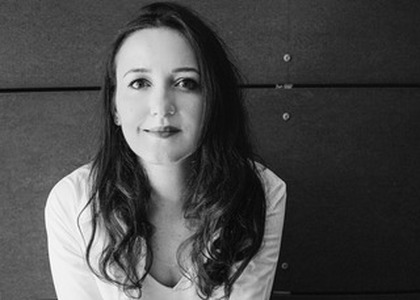> [Archived] Interviews

Interview with Angelica Postu, music therapist
Angelica Postu held a series of music therapy courses in Dumbrăvița at the end of last year.
Mrs. Angelica Postu, you held a series of music therapy workshops with and for parents in Dumbrăvița between the 8th and 10th of December. What were the activities and how was the initiative received?
In Dumbrăvița, we held workshops on emotional expression through music both for the pupils of the Dumbrăvița school and for parents. The workshops took place three days in a row and are part of the project "Musical Dumbrăvița", which is run under the aegis of the Artistic Tribe of Timișoara. It was particularly nice because we collaborated with a music teacher from Timișoara, but also with the music teacher from Dumbrăvița school, who agreed to participate in this experiment.
We wanted, first of all, to give the children from Dumbrăvița school the chance to get to know musical instruments, because often the music class is more theoretical or receptive. This gave them the opportunity to get to know more musical instruments and to play some musical stories. We did some very nice exercises with them to express themselves through music and encouraged them to express themselves freely and to make associations between image and sound, but above all we encouraged them to discover their own emotions.
On the 9th and 10th of December, our workshops continued with the focus this time on parents, to whom we first offered a workshop in which we discussed the positive impact of music in everyday life for children and encouraged them to pursue musical activities with their children and together even sing and dance with them and encourage them to learn musical instruments.
I could say it was a very beneficial workshop and I could even give you an example. One of the mums told me that she didn't dare to sing with her little girl out of embarrassment that maybe her voice didn't sound beautiful enough and she wrote to me afterwards that all the advice she received at the parents' workshop she applied at home and it had a positive impact.
On the last day of the Wellbeing through Music workshops in Dumbrăvița, I gave a presentation on "why we listen to music and what the effects of music are on us both physically and emotionally".We wonder if there is a right recipe, what kind of music to listen to... or perhaps it's interesting to learn how technology has evolved to detect the effects of music on the brain and what methods of application are scientifically proven to be beneficial. We also talked about an interesting phenomenon of how the way we listen to music has changed, that we are unfortunately victims of this shuffle phenomenon that music listening apps impose on us, and encouraged people to spend more quality time listening to music as we do in the concert hall. The impact was positive, people were very receptive and had many questions about what we told them.
Music therapy is a relatively new science in our country. What is the role of music therapy today and how do you think it will develop in the near future in Romania?
Music therapy is showing great promise. There is the Romanian Music Therapy Association that we founded in 2017 and since then we have taken a lot of steps, especially bureaucratic ones, because we very much want music therapy to be implemented both in the academic space and in the practical space.
What is special about music therapy is that we are talking about a therapeutic relationship. In contrast to some music workshops that we do with children, the therapeutic relationship has an impact, it has changed something in the behaviour of the participant, whether they are a child or an adult, and it can positively change many aspects of cognition, motor skills, behaviour, emotion detection... It is a scientifically proven therapy that has the foundations of psychotherapy. So, it is something extremely beneficial and a proper implementation of it in the system in which we operate - the bureaucratic one, as I said, but also the one that allows us to train music therapists according to European standards and at the academic level - is underway and we very much want to have a training program at the University of Music in Bucharest. I am working very hard on this, investing a lot of energy and time.
More articles have appeared, there has been an increased interest from the public, from those who would like to train in this direction. I come a little bit with this Western perspective from Berlin, the city where I work, with the hope that we borrow the best, which is this organisational aspect and therapy at the highest level for those who need it - from children with developmental problems, children with autism, to the elderly with dementia and Alzheimer's disorder. Music does a lot of good and we need to use it at the highest level.
Photo credit: Roxana Enache
Translated by Andreea Petrescu,
University of Bucharest, Faculty of Foreign Languages and Literatures, MTTLC, year II
Corrected by Silvia Petrescu














